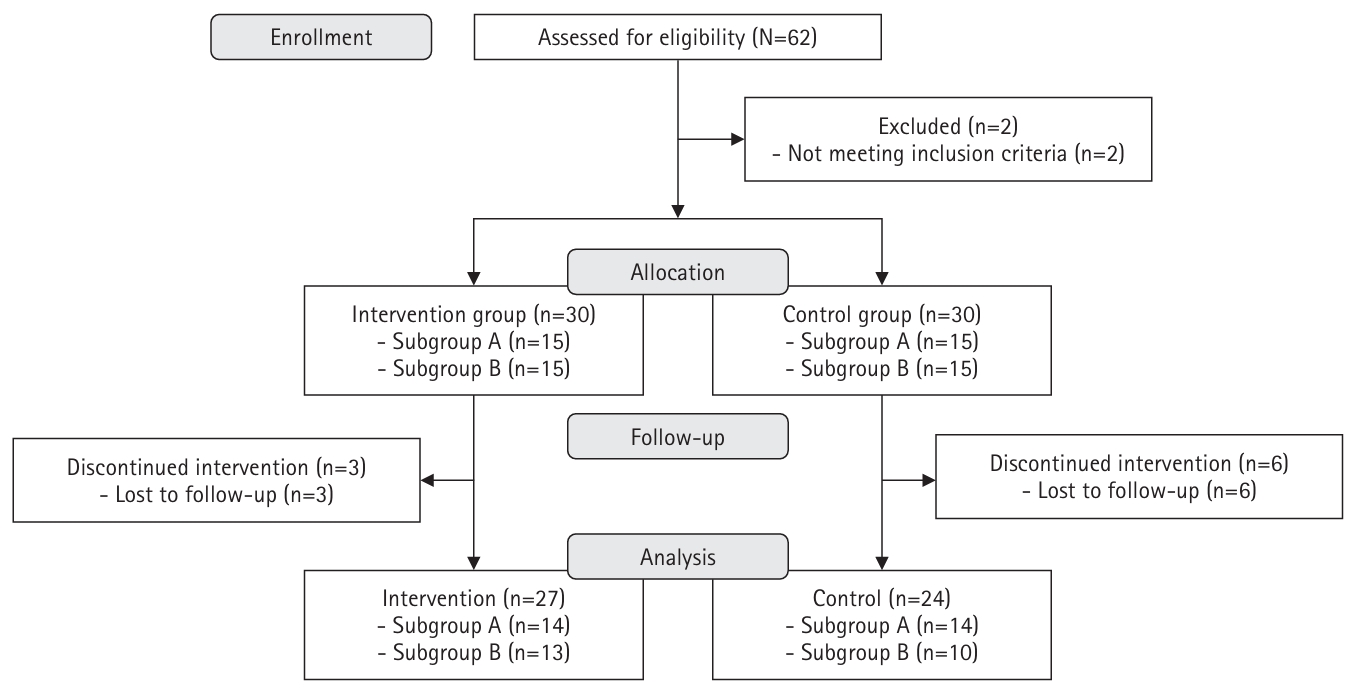-
A non-face-to-face diabetes self-management program based on self-efficacy theory and health literacy: a non-randomized controlled trial
-
Jung Hee Lee, Soo Jin Lee
-
J Korean Acad Nurs 2025;55(2):165-177. Published online May 23, 2025
-
DOI: https://doi.org/10.4040/jkan.25009
-
-
 Abstract Abstract
 PDF PDF ePub ePub
- Purpose
This study aimed to assess the impact of a non-face-to-face diabetes self-management program based on self-efficacy theory and focusing on health literacy.
Methods
A quasi-experimental, nonequivalent control group pre–post design was used. Participants from a community health promotion center were included if they (1) were 30–70 years of age, (2) had type 2 diabetes with glycated hemoglobin (HbA1c) ≥6.5%, and (3) had internet access via computers or mobile devices. The 8-week program was developed based on self-efficacy theory, and it included virtual education using an online platform, telephone counseling, videos, and social networking site activities considering health literacy. Fasting blood glucose levels, HbA1c levels, diabetes self-efficacy, social support, depression, and self-management behaviors were assessed. Data were analyzed using the independent t-test, paired t-test, and others.
Results
Post-test results showed that the intervention group had significantly lower fasting blood glucose levels and improved diabetes self-efficacy, social support, and self-management behaviors compared with the control group. An analysis of the pre-to-post changes in scores indicated that the intervention group had significantly greater improvements in fasting blood glucose levels, diabetes self-efficacy, and overall diabetes self-management behaviors than those observed in the control group.
Conclusion
Non-face-to-face programs based on self-efficacy theory that consider health literacy can provide effective diabetes management support to patients when in-person diabetes management at community health centers is challenging.
-
Successful Aging of Korean Older Adults based on Rowe and Kahn's Model: A Comparative Study According to the Use of Community Senior Facilities
-
Soo Jin Lee, Misoon Song
-
J Korean Acad Nurs 2015;45(2):231-239. Published online April 30, 2015
-
DOI: https://doi.org/10.4040/jkan.2015.45.2.231
-
-
 Abstract Abstract
 PDF PDF
-
Purpose
This study was conducted to examine the prevalence of successful aging and factors influencing successful aging.
Methods
This was a secondary analysis study. Data were analyzed from 10,462 elderly people who participated in the 2011 National Elderly Survey. According to the use of community senior facilities, participants were divided into 4 groups: those who used senior centers (group A, n=580), village senior clubs (group B, n=3,240), both of the 2 facilities (group C, n=339), and neither of the 2 facilities (group D, n=6,303). Cross-tabulation and logistic regression were performed.
Results
The prevalence of successful aging was highest in group C (20.94%) and lowest in group D (10.41%). The physical & mental function and active engagement domains were highest in group C, while they were lowest in group D. The disease & risk factors domain were highest in group A, while lowest in group B. An educational level of middleschool or higher and income level in the third or higher quintile were significant factors for predicting successful aging in all groups.
Conclusion
These results provide a basis for designing prevention and management programs as interventions to increase the prevalence of successful aging in Korean older adults.
-
Citations
Citations to this article as recorded by  - Determining the affecting predictors on successful aging among older adults in Iran
Mohsen Shafiee, Raoof Nopour, Esmat Mirbagheri, Homa Hajizadegan, Hadi Kazemi-Arpanahi
Journal of Education and Health Promotion.2025;[Epub] CrossRef - Residential Environmental Factors Affecting Healthy Aging Among Older Adults: A Comparison Between Urban and Rural Areas in South Korea
Bongjeong Kim
Journal of Korean Public Health Nursing.2025; 39(3): 340. CrossRef - Changes in successful aging and its related indicators among community-dwelling older adults: The Korean Frailty and Aging Cohort Study (KFACS)
Hohyun Seong, Sohee Kim, Hyunsook Shin, Chang Won Won, Youn-Jung Kim
Geriatric Nursing.2024; 59: 392. CrossRef - Comparative analysis of successful aging in young-old and old-old adults based on Rowe and Kahn’s model: A secondary data analysis
Ji Eun Lee
Journal of Korean Gerontological Nursing.2024; 26(2): 203. CrossRef - Using an adaptive network-based fuzzy inference system for prediction of successful aging: a comparison with common machine learning algorithms
Azita Yazdani, Mostafa Shanbehzadeh, Hadi Kazemi-Arpanahi
BMC Medical Informatics and Decision Making.2023;[Epub] CrossRef - Prediction of successful aging using ensemble machine learning algorithms
Zahra Asghari Varzaneh, Mostafa Shanbehzadeh, Hadi Kazemi-Arpanahi
BMC Medical Informatics and Decision Making.2022;[Epub] CrossRef - Associations of the related factors of depression, social support and social participation in kyungro‐dang among older adults in South Korea: A structural equation modelling analysis
Hocheol Lee, Seokjun Moon, Geurum Song, Eun Woo Nam
Nursing Open.2021; 8(2): 562. CrossRef - Factors Associated with Successful Aging among Community-Dwelling Older Adults Based on Ecological System Model
Hye-Young Jang
International Journal of Environmental Research and Public Health.2020; 17(9): 3220. CrossRef - The Effect of Basic Psychological Needs and Wisdom on Successful Aging in the Elderly
Min-Jeong Nam, Young-Mun Cho
Korean Journal of Adult Nursing.2018; 30(1): 70. CrossRef - Factors Affecting the Successful Aging of Late Middle-Aged Adults
YonJi Kim, JuHee Lee, Young Joo Lee
Korean Journal of Health Promotion.2018; 18(2): 90. CrossRef - Correlates of Successful Aging in South Korean Older Adults: A Meta-Analytic Review
Sin-Hyang Kim, Sihyun Park, Kyung-Sook Park
Asia Pacific Journal of Public Health.2017; 29(7): 544. CrossRef - Successful Aging and the Influencing Factors in the Korean Elderly: Focused on Family Support
SongYi Han, Soon-Nyung Yun
Journal of Korean Academy of Community Health Nursing.2015; 26(4): 372. CrossRef
-
1,840
View
-
19
Download
-
12
Crossref
|






